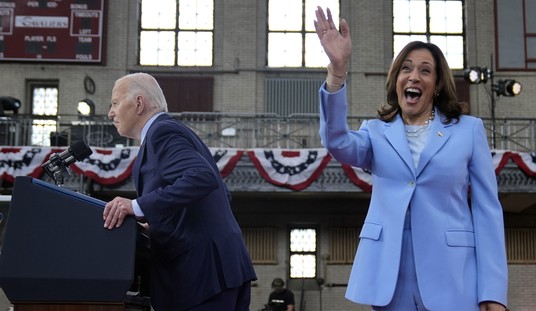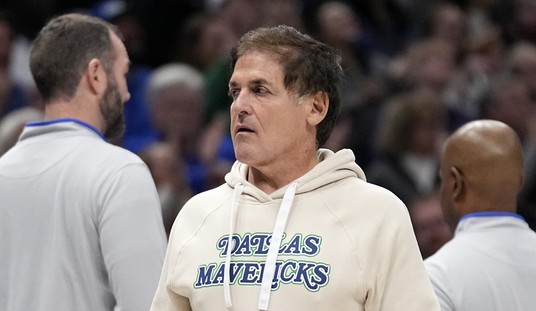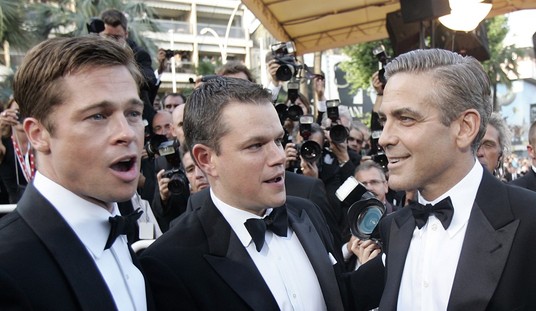The administration’s abrupt transition from complacency to near panic on the rise of ISIS recalls Donald Rumsfeld’s famous dictum. But before the dictum, first the panic. The New York Times captures the sudden shift in attitude in its opening paragraphs of an article by Mark Mazzetti and Helene Cooper:
Earlier this year, President Obama likened the Islamic State in Iraq and Syria to a junior varsity basketball squad, a group that posed little of the threat once presented by Osama bin Laden and Al Qaeda.
But on Thursday, Defense Secretary Chuck Hagel called ISIS an “imminent threat to every interest we have,” adding, “This is beyond anything that we’ve seen.”
Now there was no more talk of amateur opponents. Indeed the media outlets were playing up ISIS threats to the president’s hometown of Chicago. The rest of the NYT Mazzetti-Cooper article examined the debate over the seriousness of the threat without reaching a conclusion. Donald Rumsfeld warned there would be days like this: a man must always expect the unexpected.
Reports that say there’s — that something hasn’t happened are always interesting to me, because as we know, there are known knowns; there are things that we know that we know. We also know there are known unknowns; that is to say we know there are some things we do not know. But there are also unknown unknowns, the ones we don’t know we don’t know.
There are things we do not know and NPR said the failed rescue of James Foley “reveals the challenges faced by US intelligence”. Yet at least it was, to the intelligence community at least, a known unknown.
The U.S. doesn’t really have much in the way of assets on the ground there. The U.S. is allied with the Free Syrian Army. That’s the group that’s fighting the Assad government. But they apparently provide very little in the way of really good intelligence. So instead, and the secretary of defense alluded to this, the intelligence community has to figure out what’s going on by cobbling together information from cell phone calls, Internet traffic and the surveillance from overhead drones.
President Obama’s earlier dismissal of ISIS in January falls into a much more serious category. In an interview with David Remnick of the New Yorker, he boasted that there were now no significant threats worth considering. Al Qaeda had been “decimated.” When Remnick challenged that claim, pointing out that the Black Flag was flying over Fallujah, the president famously waved it off. He characterized ISIS as a “jayvee” or junior varsity team, not even to be taken seriously.
“The analogy we use around here sometimes, and I think is accurate, is if a jayvee team puts on Lakers uniforms that doesn’t make them Kobe Bryant,” Obama said, resorting to an uncharacteristically flip analogy. “I think there is a distinction between the capacity and reach of a bin Laden and a network that is actively planning major terrorist plots against the homeland versus jihadists who are engaged in various local power struggles and disputes, often sectarian.”
In retrospect it was clear Obama didn’t know the true state of affairs. He didn’t even suspect he had got it wrong; it was an “unknown unknown” to him. And not just in some insignificant detail but an error lurking in the facts which made up the very cornerstone of his strategic thinking. The Remnick article clearly illustrates just how critical the mistakes were. Remnick recounted:
Obama told me that what he needs isn’t any new grand strategy—“I don’t really even need George Kennan right now”—but, rather, the right strategic partners. “There are currents in history and you have to figure out how to move them in one direction or another,” Rhodes said. “You can’t necessarily determine the final destination. . . . The President subscribes less to a great-man theory of history and more to a great-movement theory of history—that change happens when people force it or circumstances do.” (Later, Obama told me, “I’m not sure Ben is right about that. I believe in both.”) …
At the core of Obama’s thinking is that American military involvement cannot be the primary instrument to achieve the new equilibrium that the region so desperately needs. …
Ultimately, he envisages a new geopolitical equilibrium, one less turbulent than the current landscape of civil war, terror, and sectarian battle. “It would be profoundly in the interest of citizens throughout the region if Sunnis and Shias weren’t intent on killing each other,” he told me. “And although it would not solve the entire problem, if we were able to get Iran to operate in a responsible fashion—not funding terrorist organizations, not trying to stir up sectarian discontent in other countries, and not developing a nuclear weapon—you could see an equilibrium developing between Sunni, or predominantly Sunni, Gulf states and Iran in which there’s competition, perhaps suspicion, but not an active or proxy warfare.
Now that the Sunni/Shi’a civil war has made a mockery of his “equilibrium” and Homeland Security prepares to defend Chicago, the analytic problem is better presented in the reverse: what didn’t the president get wrong? His foreign policy isn’t in need a tweak or a tuneup; in fact the question now is whether any parts of it can still be salvaged. He can’t drive it to the used car lot and sell it to someone else. The best he can do is tow it to the junkyard.
To salvage anything he has to go back to the known knowns. Like a man in a swimming pool who belatedly realizes that he can’t swim, his first step must be to extend his foot to see if he can reach bottom. If not, then where is the nearest gutter? The problem is the floundering man in the pool had introduced himself as the next Michael Phelps. Now he has to save himself without letting on.
The administration is caught between demoralization and the need to maintain appearances. More broadly, this is true of the left as a whole in this moment of crisis. Try as they might, the left can’t think of a way to reverse the catastrophes of their making because, like a bad leak that can’t be addressed by a washer change, the fault lies behind their wall. To fix things they’re going to have to rip everything out and start almost from the beginning.
The attraction of Ferguson was it offered them momentary escape into a re-enaction of the Old Days. Freedom Rider and all that. But it’s 2014 and not 1964 and when Ferguson fades, ISIS and Putin and the recession will still be there. Neither Obama nor the Left can handle the truth, so they won’t handle it.
Therefore they will remain transfixed, in a state compounded of fear, nervous laughter, bravado and denial, until a hit big enough comes along to snap them out of it. But the fear is there. It was there even when Remnick interviewed Obama in January. Like a man feeling the first indefinite symptoms of a disease, he must have guessed something was wrong and already thinking of how to shift the blame.
“One of the things that I’ve learned to appreciate more as President is you are essentially a relay swimmer in a river full of rapids, and that river is history,” he later told me. “You don’t start with a clean slate, and the things you start may not come to full fruition on your timetable.”
Rumsfeld would have guessed Obama would look for someone to blame, for that was a known known. The catastrophes and cascade of failures had one simple cause in his universe: someone else. The buck stops there. His predecessor had dropped the baton in the relay race of history and it was his sad duty to be the victim. Whatever betide, whatever befall, remember: he could have been a contender.
Recently purchased by readers:
SAS Survival Handbook, Revised Edition: For Any Climate, in Any Situation
Pop Secret Light Butter Flavor, Microwavable Popcorn
Lawrence Block on Writing: Three Volumes in One: Writing the Novel, The Liar’s Bible, and The Liar’s Companion
Zipper Fixer Kit: LG; 2-Pack
Phantastes
Condor Tool and Knife El Salvador Machete, 18-Inch Micarta Handle, Leather Sheath
Recommended:
Paper Mate InkJoy 100 Stick Medium Point Advanced Ink Pens
Laptop Lunches Bento-ware Bento Lunch Box
Texas Instruments Nspire CX CAS Graphing Calculator
LJ Hutchen Mark II Bb Clarinet
Bissell 1132A Symphony All-in-One Vacuum and Steam Mop
Did you know that you can purchase some of these books and pamphlets by Richard Fernandez and share them with you friends? They will receive a link in their email and it will automatically give them access to a Kindle reader on their smartphone, computer or even as a web-readable document.
The War of the Words for $3.99, Understanding the crisis of the early 21st century in terms of information corruption in the financial, security and political spheres
Rebranding Christianity for $3.99, or why the truth shall make you free
The Three Conjectures at Amazon Kindle for $1.99, reflections on terrorism and the nuclear age
Storming the Castle at Amazon Kindle for $3.99, why government should get small
No Way In at Amazon Kindle $8.95, print $9.99. Fiction. A flight into peril, flashbacks to underground action.
Storm Over the South China Sea $0.99, how China is restarting history in the Pacific
Tip Jar or Subscribe or Unsubscribe to the Belmont Club









Join the conversation as a VIP Member